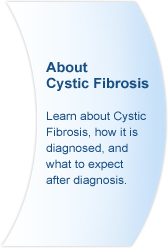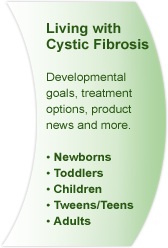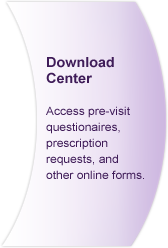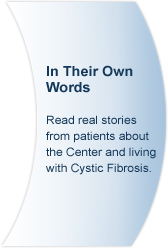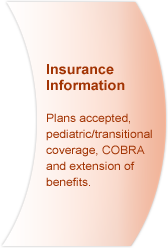|
|||||||
 |
 
ADULTSDownload helpful resources here! The CFF has created a special page to respond to the unique issues faced by adults with CF. Click here. 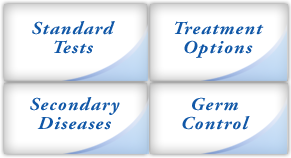
Latest NewsResponding to our patients: Adult self administration program Self Administration Program: If admitted to LIJ, you'll find yourself on 5 North. The CF team has developed a self administration program where, if you so wish, you will be able to self-administer your daily CF maintenance medications in the hospital. The need for this program arose from CF patients' complaints that hospital's schedules did not coordinate with their specific needs, often resulting in missed doses especially if people with CF were asleep or out of their rooms. Presently, CF patients are given the option self administer some or all routine daily medications. Medications for self administration include their short and long acting beta agonists (such as albuterol, Advair) either via hand held puffer or nebulizer, pancreatic enzymes, CF vitamins, TOBI®, Pulmozyme ®, and hypertonic saline. If you choose to self administer, the nurse manager picks up a lock box from the pharmacy containing the CF medications and delivers to bedside nurse (RN) within 4 hours of your arrival to 5 North. The RN will explain the use of box, refilling procedure, and proper documentation of self administration. A respiratory therapist will supply you with any respiratory equipment necessary for self- administration. This way, you become an integral part of this process by participating and documenting administration of medication. Adherence to regimen and proper administration techniques are monitored by medical, nursing and respiratory therapy staff. New Clinical Trial on Tobi Inhalation Powder The CF center will participate in a new clinical trial on Tobi Inhalation Powder (TIP). This phase 4 trial is being conducted with Novartis and seeks to answer the question of inhaled antibiotic usage in people with CF chronically infected with pseudomonas. Subjects will randomized to receive TIP twice a day every other month (the standard protocol) vs. using TIP once daily but on a monthly basis (i.e. no interruption). There is no placebo group. Inhaled Vancomycin Study The CF center will be participating in the inhaled Vancomycin study. Savara Pharmaceuticals, a small Texas based company is working in conjunction with the national Cystic Fibrosis Foundation to test dry powder inhaled Vancomycin for the treatment of methicillin-resistant staphylococcus aureus (MRSA) in CF. Chronic lung infections with MRSA is now found in over 20% of people with CF and these infections are associated with a decrease in lung function. Presently, the IV form of Vancomycin is nebulized, but since it is not developed specifically for inhalation, it can cause lung irritation and is not well tolerated. This new dry powder formulation, similar to dry powder Tobramycin, is designed to be non irritating to the lungs. Our CF center hopes to start enrolling patients in late January 2014. The adult center will be participating in another Vertex study The adult center will be participating in another Vertex study. This one is studying people with CF that have only one delta F508 mutation (heterozygote). Vertex will be administering its compound the 809 (a pill) in combination with its approved drug Kalydeco. There will be a placebo group. We hope to start recruiting by end of July 2013. Adult Guide to Cystic Fibrosis at CFF.org The Adult Guide to Cystic Fibrosis — is a one-stop source for accurate information and practical advice on all aspects of living with CF, with pages packed with answers, tips, tricks, and tons of resources related to your health and well-being, all compiled from advice from medical experts and others living with CF. The specific challenges of being an adult with CF - finances, relationships, work — are covered as well. http://www.cff.org/adults/ Status of Gene Therapy in CF The CF gene was discovered in 1989; and it was thought that a cure, especially a genetic one, would be close behind. Since then many attempts have been made, in the laboratory and in clinical trial settings, to correct the CF defect with gene therapy. In fact, more than 20 clinical trials have been conducted with a variety of viral and non viral gene transfer agents. Unfortunately, there have been many problems with CF gene transfer. The lung itself presents a barrier as it tries to protect itself from anything foreign, and the body's immune system recognizes the transfer agent as foreign and attacks it. The use of a virus to transfer the gene also results in a mild infection. There have also been problems with transferring enough normal genetic material and in many cases several applications (via bronchoscopy) had to be done. Major questions still remain: how much correction of the defective gene must be achieved? and how would this translate into clinical benefit for people with CF? Research is now centered on the use of non-viral agents that can be 1) manufactured in large quantities, 2) nebulized into the lungs, and 3) are safe for inhalation. This is still in early stages of research, but progress has been made to make these agents more "humanized" so there will be less chance of them causing an infection or being destroyed by the body's own defenses. Source: Jane C. Davies and Eric W. F. W. Alton : Gene Therapy for Cystic Fibrosis. Proc Am Thorac Soc Vol 7. pp 408-414, 2010 Improving Outpatient CF Care at the Adult Center Our adult CF Center was selected by The Cystic Fibrosis Foundation (CFF) as one of ten adult centers in the nation to participate in an adult Quality Improvement initiative to provide our people living with CF the opportunity to partner with us in education/re-education of airway clearance techniques (ACT) to stabilize and improve lung health. Interestingly, we discovered, through surveys and from speaking to our patients, that many are not performing ACT effectively and/or adequately. This is very important because if we do nothing but improve adherence to CF care by properly using ACT and other available drugs; we will increase life expectancy in people living with CF by five years! We are asking all our adult patients to please make an appointment to meet with Donna Tsang, our CF respiratory therapist and director of the PFT lab. To make this appointment, call Maria, Donna's secretary at 516 465-5420. This session will last 60 minutes. Patients who already did this, found the session very helpful. This can be done at same time when you come to see our doctors. Please bring your ACT devices (Acapella, Flutter, Vest garment {not machine}, Precursor) with you so Donna can check your technique and give you instant feedback and suggest any improvement (if any is needed). Katherine will also go over CF physiology and the importance of daily treatment. Patients are a very important part of our CF team and we need your help and input to improve your lung health. VitaminsAs an adult with CF, you need to continue taking vitamin supplements, especially if you have pancreatic insufficiency or liver disease. Your body may not be able to absorb these vitamins to adequate levels if you rely on diet alone. Vitamins must come from food and from supplements, or be absorbed through the skin (vitamin D). You may not notice the early signs of vitamin (and mineral) deficiencies, but if ignored, these deficiencies can lead to problems, such as nerve damage, liver disease and bone demineralization.Most individuals with CF will have inadequate blood levels of vitamins A, D and K unless they take vitamin supplements. These are fat-soluble vitamins and are best absorbed when taken with high-fat foods and pancreatic enzymes. If you buy vitamins in a water-soluble form, you can take them at any time. Look for the terms "water-soluble" or "water-miscible" on the label. In general, water-soluble vitamins are well-absorbed by people with CF (vitamin B12 may be an exception, particularly if you limit the amount of meat in your diet). You will need approximately twice the RDA (recommended dietary allowance) of vitamins as someone who does not have CF. However, it is not safe or healthful to take too many vitamins. What is Vitamin D? Vitamin D helps the body absorb calcium that is essential for strong bones. Without enough vitamin D, bones can weaken and increase the risk of breaking a bone. Studies suggest it also helps with immune function, and the reduction of inflammation. Vitamin D comes from two sources; it is made by skin when exposed to sunlight and it is in the foods we eat. Surprisingly few foods contain vitamin D — unless it's added to the food. Food Sources of Vitamin D include...
People with CF are at a higher risk of developing a vitamin D deficiency. You can prevent deficiency by taking a vitamin supplement. It is recommended to take your ADEK vitamin supplement with food and enzymes. Vitamin D is absorbed by the body when taken with fat containing foods. Why are Vitamins important for people with Cystic Fibrosis? Malabsorption of fat soluble vitamins is likely in most patients with CF, particularly those who are pancreatic insufficient; that is those who take pancreatic enzymes like Creon or Zenpap. Fat soluble vitamins, such as Vitamin A, Vitamin D, Vitamin E and Vitamin K have many important roles. Vitamin A Low vitamin A levels are associated with impaired lung function, lower weight and lower bone mineral density. Foods with Vitamin A are found in animal sources such as liver, dairy product and fish oils. Vitamin E Vitamin E may be important in controlling the progression of lung disease. It is found in vegetable oils, nuts, fortified margarines and cereals, broccoli and spinach. Vitamin K Vitamin K plays a role in bone growth. Vitamin K helps your blood clot better Vitamin K is primarily found in green, leafy vegetables such as kale, spinach, collards, Swiss chard, broccoli, cabbage, and Brussels sprouts. When cooked, the vitamin K content of these foods is higher. What Can I Do You can prevent deficiency by taking a vitamin supplement. It is recommended to take your ADEK vitamin supplement with food and enzymes. Vitamins A, D, E, K is absorbed by the body when taken with fat containing foods. Note that the usual vitamin supplements, including maternal vitamins, do NOT have the amounts present in ADEK and may not be adequate vitamin supplementation for people with CF. Pancreatic EnzymesReplacement pancreatic enzymes are a very important part of the daily medical management for most people with CF. Enzymes in capsule form are necessary to replace the natural enzymes that most people with CF are unable to get to their intestines, so that their food can be digested properly. By taking the right amount of enzymes, fatty stools and abdominal symptoms such as cramping, gas and bloating can be controlled. Remember, your enzyme dose has been individually calculated for you, so please take them according to your dosing guidelines. Also, always have the prescribed brand of enzymes dispensed to you. Enzyme preparations vary from manufacturer to manufacturer. Generic enzymes may not provide the same amount of amylase, lipase and protease that your system needs.You'll know that your enzyme intake is appropriate if you typically have one or two non-greasy bowel movements a day. Diarrhea and/or bulky, foul-smelling stools could indicate that you are not taking enough enzymes - and constipation may mean that you are taking too much. If your current enzyme does not seem to be right, consult your CF nutritionist. Acid blockers may sometimes be recommended to help increase the effectiveness of your enzyme dose. Lung FunctionThe goal of CF therapy is to keep your health and activity levels at their highest while also minimizing the adverse effects of the disease and its impact on daily life. Start with a schedule of clinic visits with your CF healthcare team for regular health maintenance and monitoring of your health status. At these visits you will have a regular physical examination and your healthcare team will ask questions to see whether you have any new or changing symptoms. They will also want to know how your treatments fit in with your daily routine. At least once a year you will have a more extensive examination - full pulmonary function studies, sputum cultures, and blood studies for liver and kidney function and nutritional status. Chest x-rays will be followed on a regular basis. At some point, you may be asked to go through an exercise study, and each fall you should have a flu shot. If you are sick your doctor will want to see you more often, and may recommend that you spend some time in the hospital for more intensive treatments.Airway Clearance Clearing your airways of mucus is necessary for maintaining lung function. There are several chest physical therapy (CPT) options that can help airway clearance. Your respiratory therapist or other healthcare team member will work with you to find an airway clearance treatment that works best for you. The current options include different breathing methods and devices such as the Flutter®, the ThAIRapy Vest®, and the positive expiratory pressure (PEP) mask, all of which can be used without an assistant. You may be able to combine the used or inhaled bronchodilators with other airway clearance treatments. You may also be prescribed a synthetic form of the DNase enzyme, called Pulmozyme® (dornase alpha), which is to be inhaled using a compressed air (jet) nebulizer and a compressor, to clears the mucus in the lungs. In addition to these treatments, physical exercise may help with airway clearance by loosening mucus. Your CF healthcare team will help you develop an appropriate exerciser program and help you adjust your diet so that you maintain your weight and nutritional status. Dealing with Infection Most people with CF have a low-grade lung infection. Every now and then, despite your best efforts, you will probably have a more serious infection (an exacerbation) that must be treated aggressively. You can tell you are getting an exacerbation when you:
As soon as you notice any symptoms of an exacerbation you should contact your doctor. Your doctor may take a sputum culture to determine what organism(s) is causing it. Certain organisms tend to infect people with CF. While waiting for sputum culture results, your doctor may start antibiotic treatment, and then adjust the treatment once the organism causing your infection has been determined. Antibiotics must be taken until the exacerbation is completely cleared, usually for 2 weeks or longer, even if you are feeling better before that time. Sometimes, your body will not respond to oral antibiotics and you will have to take them intravenously, often in the hospital. Many adults with CF check into the hospital once every year, even if they don't feel especially sick, just to go through a course of intensive antibiotic treatment. Others prefer to take IV antibiotics at home. Some adults with CF are taking some form of antibiotic treatment on a regular basis. Many infections have become difficult to treat, usually because the organisms that cause them are resistant to many of the commonly used antibiotics. Some of the organisms found in the lungs of people with CF can be spread by person-to-person contact. Thus, it is often recommended that people with CF be careful about close contact with other people who have CF. Washing your hands; frequently covering your mouth when you cough; avoiding touching your eyes, nose and mouth; and disposing of secretions properly are simple and effective ways of reducing the chance of spreading or acquiring infections. Additionally, you should avoid, within reason, other persons with colds or other viral or bacterial infections or respiratory illnesses, avoid tobacco smoke and other irritants (air pollution, pollen, mold, barbecue smoke, burning leaves), avoid outdoor activity when the air quality is poor, and keep nebulizers clean and dry. Learn more about germ control here. Flu Shots The flu season in the U.S. lasts from November through March or April. Influenza can lead to severe exacerbations of CF lung disease. Experts, including the Cystic Fibrosis Foundation and the Centers for Disease Control and Prevention (CDC), recommend that people with CF (older than 6 months) be vaccinated. You should not get a flu shot if you have ever had a serious allergic reaction to eggs or an influenza vaccine, have a history of Guillain-Barre syndrome or paralysis, or if you are seriously ill when your shot is scheduled. Your flu shot should be scheduled between September and December, and you should be vaccinated every year. SmokingWhether you smoke or breathe in secondhand smoke, cigarette, cigar and marijuana smoke is harmful to your lungs. Lung damage is more pronounced in those with CF than in people with normal lung function, especially if asthma is part of the condition. Smoking irritates lung tissue, resulting in increased coughing and mucus production. If you have gastro esophageal reflux, smoking or being around smoke may make it worse. You will also not be considered for lung transplantation if you are a smoker.People with CF need to avoid active smoking. If you don't smoke, please don't start. If you do smoke, stop! Also, avoid secondhand smoke as much as possible - this includes smoke from barbecues, bonfires and campfires. Alcohol UsePeople with CF have health risks associated with the use of alcohol that do not apply to other people. From a medical standpoint, there are several reasons why you should be cautious about drinking alcohol:
DehydrationDehydration is an abnormally low level of fluid and electrolytes (salts, such as sodium potassium and chloride) in your body. It can result from diarrhea, severe vomiting, excessive sweating and inadequate food intake. As mentioned above, drinking alcohol can cause dehydration. People with CF are more susceptible to dehydration than other adults. Often this is because there has been a reduction in kidney function or because of the medications being taken, such as some antibiotics, require greater fluid intake. Sweating from exercising may also cause dehydration in people with CF, especially in hot and humid weather. Dehydration and salt loss can contribute to DIOS or heatstroke.For people with CF, thirst is not a reliable indicator of dehydration. Look for:
In general, you should try to take in about 3 quarts of fluid a day (or more if you are exercising or sweating a lot). Drink fluids in small amounts frequently during the day. Drinking fruit juice supplements your calorie, vitamin and mineral needs at the same time that it increases your fluid intake. Remember that you can get fluids from foods, too - such as gelatin and ice cream. Many fruits and vegetables, such as watermelon, have a high water content. Dehydration can occur very quickly. Do not wait until you are thirsty to replace lost fluids. When you are dehydrated, you should avoid caffeine, which acts as a diuretic. TreatmentPD & P Positions for AdultsAdult/Upper Lobes/Apical Segments: Sit on a chair and lean backward on a pillow at a 30-degree angle. Percuss and vibrate over the muscular area between the collarbone and the top of the shoulder blade on both the left and right sides. Click here for more information and diagrams of proper PD&P positions. For more information on treatment options, click here. Lung TransplantationLung transplantation is a feasible option for people with advanced lung disease due to CF, and this surgery is now available at several specialized centers. There is no guarantee of success, however, so it is best to work with your healthcare team to prevent and slow the deterioration of your lung function. People with CF who undergo lung transplantation have an estimated 70% to 80% chance of 1-year survival and a 48% chance of 5-year survival. There is a shortage of donor lungs, so the wait for lungs is approximately 18 to 24 months after being placed on the candidate list. For many people on the list, survival until transplant is a key issue. Therefore, even though it might seem premature to start discussing lung transplantation, your healthcare team might advise you to start the process early enough to allow the waiting time.Reproductive HealthBecause you have cystic fibrosis, there are reproductive health issues that will affect you differently than they affect other people - and that can have an enormous impact on your health status and quality of life.Major issues related to sexual activity for people with CF are:
Puberty occurs later and more slowly in boys with CF than in other boys. Men with CF have normal sexual drives and function. However, 98% are infertile. Men with CF produce normal sperm, but the tubes that transmit sperm are absent, a condition called congenital bilateral absence of the vas deferens (CBAVD). Advances in medical technology are making it possible for some men with CBAVD to father children, but the success rates remain low and the procedure is costly. Even though the risk of contributing to an unplanned pregnancy is low for men with CF, it is still very important to use condoms to avoid STDs and any possible unplanned pregnancy. Sexual Function Sexual activity for some people with CF may present some special challenges. If you are not in good physical condition, you could tire easily and if you have advanced lung disease, you may need supplemental oxygen to handle the increased breathing rate that happens in all sexual activities. Some people fear that they might seem unattractive to partners because of the coughing and sputum production caused by chronic pulmonary infections, and this can lead to a reluctance to enter into intimate relationships. You may be encouraged to learn that despite these obstacles, most adults with CF have remarkably normal sex lives. As part of your complete healthcare, the medical staff at the CF care center can help you assess your needs and discuss any issues you may have about sexual function. Family Planning People with CF have a number of serious issues to consider when thinking about having children. The decisions you make can have a lasting impact on your health, your life expectancy and the long-term welfare of your child. Any child you have will be a carrier of the CF gene. If your partner is a carrier of the CF gene, your child has a 50% chance of having CF. Test the father to find out if he is a carrier before getting pregnant. Lab tests on blood samples are very good at finding CF genes, though none are perfect. To learn more, ask your CF caregiver or genetic counselor. Pregnancy Women with CF should take steps to make sure that their lungs are in the best possible condition before becoming pregnant. There are data that indicate that women with CF who have children do not lose lung capacity any more quickly than women with CF who have not had children. However, nutritional needs are greatly increased during pregnancy and with breast-feeding, and many women have difficulty gaining enough weight. As the fetus grows it crowds the lungs, making breathing more difficult. Many routine CF medications, including some antibiotics, cannot be used during pregnancy because of possible harm to the fetus. This may make it harder for you to get over an infection. You should also talk to your healthcare providers about pregnancy risks, such as diabetes, that all women are subject to. By the way, you might be wondering whether ACT, especially the vest, will harm the unborn fetus. The answer is no. It is best if you are followed by a high-risk obstetrics group who has close communication with your CF team, to minimize problems during pregnancy. Parenting presents risks as well. Being a parent takes considerable energy. Very young children, especially, are a source of respiratory infections. The rewards of parenting must be carefully weighed against the risks you may face. You also need to assess the impact of your illness upon your child - how will your child react when you are ill or in the hospital, how will he or she react if you should die before he or she is grown, and who will raise your child should you die. How Your CF Care Team Can Help For maintaining good reproductive health, you will need to see a primary care physician or gynecologist for routine care such as Pap smears and breast examinations. Your CF care team can prescribe medication to prevent yeast infections that occur with the use of antibiotics. Your CF team can also help with diagnosing and treating STDs. If you have concerns about homosexuality and don't want to discuss them with your healthcare providers, most major communities have gay and lesbian services, newsletters and support groups that can help you. You may find it helpful to talk to other people with CF who have children. Ask your CF care team for contacts so that you can have phone conversations with parents who have CF or look for Internet bulletin boards and chat rooms. Late Diagnosis of Cystic FibrosisCF is usually diagnosed before 3 years of age. A late diagnosis -- one in adolescence or adulthood - usually means that the person has a mild form of the disease or that its manifestations and symptoms are atypical. The genetic mutation that leads to CF in these cases is often one of the less common ones. Since CF has been considered a pediatric disease, many physicians may not think of it when they see older patients who may have CF symptoms. Nonetheless, approximately 6% of the diagnoses of CF are made in adults and the number of late diagnoses is increasing.A late diagnosis can be a traumatic experience - filled with uncertainty, fear, denial and sometimes relief. You are learning something new about yourself - you didn't just get CF; you've always had it. Developing a sense of self that includes acknowledging having CF takes time. However, CF is an important factor in your life, one that takes on greater or less prominence depending on how severe it is. Many people with a late diagnosis of CF eventually find that they feel better about themselves than they did before they knew that they had CF. After the diagnosis is made, some people find it difficult to go suddenly from little or no treatment to a daily routine of medications and treatments, especially if they are working and parenting adults. Your clinic's healthcare team will work with you to develop routines that work for you. You may find that having a written daily schedule will help you adjust to your new routine. Importance of the CF Care Center Since your primary healthcare provider is probably a general practitioner who may have little experience in treating people with CF, it is recommended that you seek specialized care from an accredited CF care center such as this one. In addition to having knowledgeable and well-trained professionals in CF, accredited CF centers are up-to-date on the latest research and ongoing studies in CF. The staff at a CF care center has a great deal of relevant experience, a well-established support system, and access to other CF professionals worldwide. Medical insurance programs usually require referral to a CF specialist at an accredited CF care center. The CF nurse or social worker will be able to help with the referral from your primary healthcare provider to the CF care center. Hope for a Healthy FutureWhen scientists found the CF gene in 1989, they gained a great tool for finding new CF treatments and, someday, a cure. There is exciting research to change the gene that causes CF, and other research to fix the symptoms of CF. Today, there are new treatments that help many people with CF to live full, happy and productive lives - and more treatments are coming in the future. We are learning more and more about cystic fibrosis almost on a daily basis! There's good reason to be optimistic about - and to plan for - the future! |
||||||
